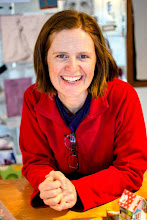In my last post, you saw my self-portrait drawing in which I was depicted wearing a button referencing my non-parent identity. That project got me to thinking about how identity develops within us.
As children, we don't go around saying things to other kids like, "I come from poverty," or "I am a feminist," or "I am a disabled person," or "I am Hispanic," and then gravitate toward others who say those same things. As children, we haven't learned to understand how those identities affect us, and so we're left to navigate social situations without that context. Sometimes I long for that. Challenging in a different way, yes, but in other ways easier. Innocent. Simple. Kids make concessions for things with a shrug. They see the "different" thing and in many cases, adjust without a second thought in order to move on.
Awareness of our identities develops as we become adults, when we reap the benefits of our privilege or experience the frustrations of prejudice. As a specific identity rises to the forefront, suddenly we find ourselves making decisions based around it.
Some people identify so strongly with one group that every situation is viewed through that lens. Chris Rock's recent performance at the 88th Annual Academy Awards is a good example of this. It happens to me too. ALL THE FLIPPIN' TIME, I consider (and judge) the world through my lens of gender and feminism. It is so prevalent that I no longer notice it. It is automatic.
Which is why I loved the book Bad Feminist by Roxane Gay. (Read the book!!!!!! Her writing is exquisite. But if you want, here is a link to her 11-minute TED talk on the same topic.)
At the time I was reading Bad Feminist, I was working on a fibers project that was to be inspired by an object. Since the book was so prevalent in my thoughts, I couldn't imagine being inspired more by any other object than that. So I used the color palette of the book design as my source.
As I shuttled my bobbin through the loom, I thought about how weaving seems such a good analogy to identity. My experience as a (white) woman and a feminist is different than another woman who identifies the same way. Were she to make a scarf, she might pick different colors, a different length or width, a different pattern, and still call it the same thing I've entitled mine: a "Bad Feminst Scarf."
Weaving speaks also to intersections. Look closely at the piece and you can see every thread intersecting with a thousand others. While they may touch each other and connect in that way, they are individual pieces of varying identities themselves: long, short, cotton, polyester, stretchy, fuzzy, soft, etc.
Identity is not a simple thread of unbleached non-stretchy 100% cotton. It is complex and intertwined with other identities. Intersectionality is another whole expanded conversation, but Roxane Gay goes there (and does it well) and I am changed for the perspective and insights her book brought me.
Her message: it is ok to claim a specific identity, even if you're not the "perfect" (by whose definition, anyway?) manifestation of it. You can call yourself a feminist and still shave your legs, love men, and like the color pink.
As I presented these thoughts to my classmates, I wrapped my "Bad Feminist Scarf" around me. And there it was: I was literally wearing my identity.
So when the idea popped up again in my self portrait last week, an image of me wearing a pin, almost like claiming my presidential candidate, it spurred a bigger idea. I want to explore identity more in my work, and wearing it seems an interesting take on the topic.
A last note: I must admit that sometimes I feel burdened by my feminist lens, and thank goodness Roxane Gay writes about a similar feeling. A democrat friend recently told me she knows a Republican who says, "Democrats are always so sensitive!" When I heard this, I had to laugh. This is a truth for me for sure. Speaking up for those who are in some way disadvantaged because of circumstances out of one's control is so important, to be sure. But do I need to ruminate incessantly about patriarchy in our culture or constantly call people out or even declare someone a bad person for being a product of this culture and therefore saying/doing something that is sexist or gender boxing?
Call me a bad feminist, but if I can just take a minute to breathe/calm down/chuckle at myself, and even let the moment pass, I boost my resilience for when the moment is right and it's more important to speak to issues that matter to me.










